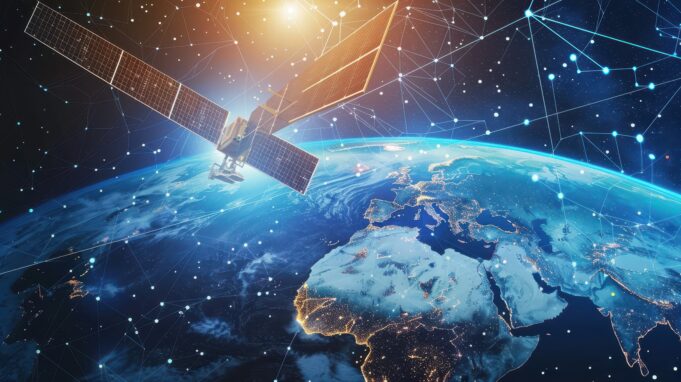After numerous delays, Senegal has finally launched its first-ever satellite GAINDESAT-1A into orbit. The feat marks the first stage of the African country’s budding national space program SENSAT.
“GAINDESAT-1A is an earth observation nano-satellite built by Senegalese engineers and technicians trained by the Centre Spatiale Universitaire de Montpellier (CSUM) via a partnership with the Senegalese government. The nano-satellite was launched from U.S. Vandenberg Air Force Base in California on SpaceX’s Falcon 9 transport rocket in its Transporter 11 mission,” reported developingtelecoms.com.

According to Africa.businessininsider.com, as of the end of 2022, the continent of Africa had successfully launched no less than 52 satellites, reported the consulting firm Space Hubs Africa. Its objective is to “triple the number of satellites sent into Earth’s orbit over the next few years.”
“From the northern reaches of Egypt to the southern tip of South Africa, these celestial emissaries not only enhance telecommunications and weather forecasting but also play vital roles in monitoring agricultural patterns, tracking climate change, and fostering educational and research opportunities,” explained Africa Business Insider.
The continent’s first satellite resulted from Africa’s desire to get out from paying America and Europe exorbitant fees to make international calls.
“Those were the days when it was only a few Africans living in Europe and America who could make calls to Africa. It was completely impossible for the ordinary African to make phone calls that could last because Africa did not have our own communication satellites and we had to rely on using the services of European satellites,” wrote columnist Honorable Saki in 2012 in modernghana.com, in a piece headlined: “Africans Will Remember Gaddafi For One Important Achievement.”
Also, the idea of connecting the entire continent to the internet, radio, television, and telephone appeared improbable for Africa, noted theafricanhistory.com, a blog site dedicated to sharing news, culture and history about the continent.
“To put an end to this, the continent merely needed to work together. Calls made within and outside of Africa were by far the most expensive in the world before Libyan leader, Muammar Gaddafi (entered the picture with his) modest but revolutionary move that transformed the connectivity of the continent,” the website noted.
Because Africa relied on U.S. and European satellites to communicate abroad, it was required to pay an “exorbitant” annual fee of $500 million. This annual fee, including its exorbitant interest rates, came to a halt when the Libyan government put $300 million on the table, followed by the African Development Bank with $50 million, and the West African Development Bank adding the balance of $27 million. With that total of $377 million, Africa purchased its first communication satellite on December 26, 2007.
This year the Africa Space Industry Annual Report documents 125 new satellites being “lined up for development in 23 African countries by 2025, as activities in the continent’s space market heat up significantly.”
The global space economy, according to Africa Business Insider, “is worth about $469 billion, while the African space industry, valued at $19.49 billion in 2021, is projected to grow by 16.16 percent to $22.64 billion by 2026.”
Marie Makuate is a scientist from Cameroon, the same Central African country as Philadelphia 76er NBA superstar Joel Embiid. She argues that the importance of the data gleaned from satellite technology should spur more African countries to launch their own space hardware.
“As a geospatial expert for the NGO Humanitarian OpenStreetMap Team, Makuate creates maps to help emergency services navigate an unpredictable territory so that people in need can be reached quickly,” the BBC reported in an April 4 article titled, “One woman’s battle to push Africa’s space race.”
Born in West Africa’s Ivory Coast, Dr. Tidiane Ouattara became the first president of the African Space Council this year. The council oversees the newly inaugurated African Space Agency (AfSA).
Dr. Ouattara, who has a Ph.D. in remote sensing and geographical information systems, fielded questions from officials during a CNN video interview about why they should care about space when their populations faced issues like a lack of access to clean water. Ouattara responded, “that African leaders are now convinced that investing in the space sector can improve terrestrial life.”
He pointed out the tangible benefits of countries in the Motherland pursuing endeavors in space. “A few years ago, a fisherman’s association in Ghana began providing weather forecasts—based on satellite information—to locals who use traditional canoes that can be dangerous in bad conditions,”
Dr. Ouattara said. Dr. Ouattara added that because of the data accessed from satellites from 2017 to 2022, “there was only one canoeing death, compared to about 15 to 18 deaths annually before the system was implemented.”
He added, “Off the coast of Egypt, satellites are being used to detect oil spills so environmental agencies can act fast to limit damage.”
Senegalese President Bassirou Dismay Faye said launching its first satellite marks a major step towards the country’s “technological sovereignty.”
“I would like to express my pride and gratitude to all those who made this project possible,” he said Aug. 16 on the social media platform X.
Follow @JehronMuhammad on X













